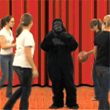Monday, 29 July 2013
The Return of the Invisible Gorilla

Somewhat like Stanley Milgram’s experiment on obedience to authority, the “invisible gorilla” experiment by Daniel Simons and Chris Chabris has become a true classic in the cognitive sciences. Milgram surprised readers with chilling evidence that people could be so compliant to authority that they would carry out orders to inflict potentially fatal electrical shocks on other individuals. Similarly, Simons, Chabris and their gorilla have overturned our belief that we always see all the things that lie in our field of vision.
In reality, that belief is far from true. Just ask experimental subjects to perform a task that demands a bit of their attention, and about half of them will fail to notice tremendous changes taking place before their very eyes, such as a gorilla walking across their television screen!
In the interview to which a link is provided below, Simons explains that in our day-to-day lives, we constantly fail to notice things that are present in our field of vision. What makes us nevertheless trust our senses so much is precisely that we are not aware of all the things that we don’t notice. So we quite naïvely assume that we always notice everything.
And the same kind of cognitive bias seems to affect many of the false impressions to which we cling because there is no researcher there to point out that we have failed to spot the gorilla—for example, thinking that we can perform several tasks perfectly all at the same time (multitask), whereas actually we are shifting rapidly from one task to another. Our tendency, though, is to notice mainly how many different tasks we have performed over a given period, and not so much the way that we have shifted among them, much less all the things that we have not perceived while doing them (for example, all the pedestrians and cyclists whom you failed to notice while talking on your cell phone while driving your car).
Simons also throws cold water on the idea, increasingly widespread in neuroscientific research about emotions, that gut instinct is the solution to all our problems. On the contrary, his studies show that though our intuitions can indeed provide sound guidance for decisions involving emotional preferences, our intuitions about subjects such as the way our brains work are often biased or quite simply false.
And this applies even to what scientists call pattern recognition. For example, North American football commentators will often describe certain quarterbacks as being able to very quickly and instinctively recognize which players on their team are most “open” and hence the best ones to whom to throw the ball. And it may be true that experience on the field, along with viewing countless videos of game situations, enables seasoned quarterbacks to recognize the well positioned receivers better than an amateur would. But when you give these quarterbacks more time to watch the same play as it unfolds on video, even the best of them will still see things that they missed the first time and that suggest better decisions they could have made.
And what about the gorilla in the experiment by Simons and Chabris? Once people have watched the video and seen the gorilla, could they possibly still miss something major that was going on within the image frame? Well, the answer is clearly yes, as you can see for youself by clicking the link “The Monkey Business Illusion” below, which takes you to a video of a modified version of the original experiment. Most people, even when forewarned that some big things will still be changing before their eyes, still miss them again.
And if you don’t think that science and comedy make good bedfellows, click the third link below and watch Simons himself present his illusion at the 2010 edition of the “Best Illusion of the Year Contest”!
![]() DID YOU SEE THE GORILLA? AN INTERVIEW WITH PSYCHOLOGIST DANIEL SIMONS
DID YOU SEE THE GORILLA? AN INTERVIEW WITH PSYCHOLOGIST DANIEL SIMONS
![]() The Monkey Business Illusion
The Monkey Business Illusion
![]() Dan Simons presents The Monkey Business Illusion
Dan Simons presents The Monkey Business Illusion
![]() Invisible Gorilla returns to show how much we haven’t learned
Invisible Gorilla returns to show how much we haven’t learned
![]() The Invisible Gorilla
The Invisible Gorilla
![]() Monkeying around with the gorillas in our midst: familiarity with an inattentional-blindness task does not improve the detection of unexpected events
Monkeying around with the gorillas in our midst: familiarity with an inattentional-blindness task does not improve the detection of unexpected events
The Emergence of Consciousness | Comments Closed







